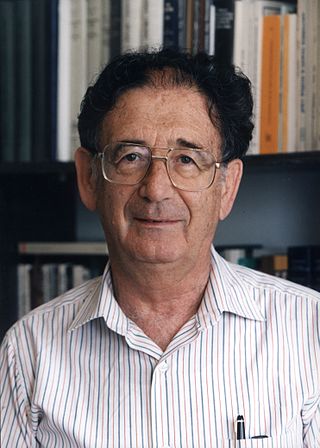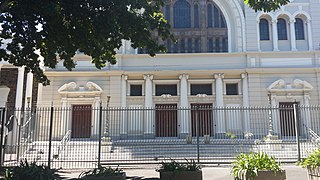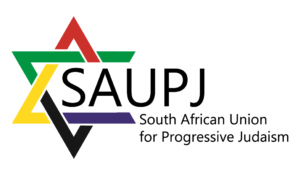Related Research Articles
The 43 Group was a British anti-fascist group set up by Jewish ex-servicemen after the Second World War. They did this when, upon returning to London, they encountered British fascist organisations such as Jeffrey Hamm's British League of Ex-Servicemen and later Oswald Mosley's new fascist party, the Union Movement. The activities of these fascist groups included antisemitic speeches in public places, and from the rank-and-file fascists, violent attacks on London Jews and Jewish property. Group members broke up far-right meetings, infiltrated fascist groups, and attacked the fascists in street fighting.
David Ian Cesarani was a British historian who specialised in Jewish history, especially the Holocaust. He also wrote several biographies, including Arthur Koestler: The Homeless Mind (1998).

Yehuda Bauer was a Czech-born Israeli historian and scholar of the Holocaust. He was a professor of Holocaust studies at the Avraham Harman Institute of Contemporary Jewry at the Hebrew University of Jerusalem.
South African Jews, whether by culture, ethnicity, or religion, form the twelfth largest Jewish community in the world, and the largest on the African continent. As of 2020, the Kaplan Centre at the University of Cape Town estimates 52,300 Jews in the country. The South African Jewish Board of Deputies estimates that the figure is closer to 75,000.
Ray Alexander Simons (née Alexandrowich; was a South African communist, anti-apartheid activist, campaigner and trade unionist who helped draft the Women's Charter. She moved to Cape Town in 1929 to escape the persecution of Jews and communists.
Antisemitic tropes, also known as antisemitic canards or antisemitic libels, are "sensational reports, misrepresentations or fabrications" about Jews as an ethnicity or Judaism as a religion.

The Gardens Shul, formally the Cape Town Hebrew Congregation (CTHC), also called the Great Synagogue, is a Modern Orthodox Jewish congregation and synagogue, located in the Company Gardens, in the Gardens neighborhood of Cape Town, South Africa. The congregation was established in 1841, making it the oldest Jewish congregation in South Africa.

Anti-Zionism is opposition to Zionism. Although anti-Zionism is a heterogeneous phenomenon, all its proponents agree that the creation of the modern State of Israel, and the movement to create a sovereign Jewish state in the region of Palestine—a region partly coinciding with the biblical Land of Israel—was flawed or unjust in some way.
The anti-Jewish violence in Central and Eastern Europe following the retreat of Nazi German occupational forces and the arrival of the Soviet Red Army – during the latter stages of World War II – was linked in part to postwar anarchy and economic chaos exacerbated by the Stalinist policies imposed across the territories of expanded Soviet republics and new satellite countries. The anti-semitic attacks had become frequent in Soviet towns ravaged by war; at the marketplaces, in depleted stores, in schools, and even at state enterprises. Protest letters were sent to Moscow from numerous Russian, Ukrainian and Belarusian towns by the Jewish Anti-Fascist Committee involved in documenting the Holocaust.

Eric Hendrik Louw was a South African diplomat and politician. He served as the Minister of Finance from 1954 to 1956, and as the Minister of Foreign Affairs from 1955 to 1963.

Antony Barry Polonsky is Emeritus Professor of Holocaust Studies at Brandeis University. He is the author of many historical works on the Holocaust, and is an expert on Polish Jewish history.
British Jews have experienced antisemitism – discrimination and persecution as Jews – since a Jewish community was first established in England in 1070. They experienced a series of massacres in the Medieval period, which culminated in their expulsion from England in 1290. They were readmitted by Oliver Cromwell in 1655. By the 1800s, an increasing toleration of religious minorities gradually helped to eliminate legal restrictions on public employment and political representation. However, Jewish financiers were seen by some as holding disproportionate influence on British government policy, particularly concerning the British Empire and foreign affairs.

The Cape Town Holocaust & Genocide Centre began as Africa's first Holocaust centre founded in 1999. It has sister Centres in Johannesburg and Durban, and together they form part of the association, the South African Holocaust & Genocide Foundation (SAHGF). The SAHGF determines the educational and philosophical direction of the centre. It also conducts teacher training and is the only accredited service-provider for in-service training in Holocaust education in the country. It has trained over 5,000 teachers.
Antisemitism in South Africa is the manifestation of hostility, prejudice or discrimination against South African Jews or Judaism as a religious, ethnic or racial group. This form of racism has affected Jews since South Africa's Jewish community was established in the 19th century.
Doris Leanna Bergen is a Canadian academic and Holocaust historian. She is the Chancellor Rose and Ray Wolfe Professor of Holocaust Studies at the University of Toronto, the only endowed chair in Canada in Holocaust history. Bergen is also a member of the Academic Advisory Committee of the Center for Advanced Holocaust Studies at the United States Holocaust Memorial Museum. She was elected a Fellow of the Royal Society of Canada in 2018.
Beit Emanuel, formally the Temple Emamuel, is a Progressive Jewish congregation and synagogue, located in Parktown, a suburb of Johannesburg, in the district of Gauteng, South Africa. The synagogue was established in 1954 and is one of the largest Progressive Jewish congregations in South Africa. It is an affiliate of the South African Union for Progressive Judaism (SAUPJ), which is part of the World Union for Progressive Judaism (WUPJ).

The South African Union for Progressive Judaism (SAUPJ) is an affiliate of the World Union for Progressive Judaism and supports 11 progressive congregations. Rabbi Moses Cyrus Weiler, a founder of Reform Judaism in the country, led the country's first Reform synagogue, Temple Israel in Hillbrow, Johannesburg. Weiler is credited with growing the movement, to represent 15-17% of South African Jewry and establishing 25 congregations in the country. A 2020 joint study by the Institute for Jewish Policy Research and the University of Cape Town showed that 12% of Jews identified as Progressive and that in relative terms the progressive strands are increasing after falling to 7% in 1998 and 2005 studies. In Johannesburg, the community accounts for 7% of the city's Jewry, rising to 18% in Cape Town and 25% in Durban.

The South African Jewish Museum is a museum of South African Jewish life, history and identity. The museum is situated in the downtown neighbourhood of Gardens in Cape Town. It is located in the grounds of Gardens Shul, and is in the same complex as the Cape Town Holocaust & Genocide Centre and the Gardens Jewish Community Centre. It is also close to the Iziko South African National Gallery and Houses of Parliament. The museum was founded by the late philanthropist, Mendel Kaplan. It documents the community's historical roots in Lithuania and elsewhere. Thereon it documents the role of South African Jewry in South African society and their contributions to a number of diverse fields.

Hyman Liberman was a Polish-born South African politician, produce merchant and philanthropist. He served three consecutive terms as the Mayor of Cape Town between 1904 and 1907. He was the city's first elected Jewish mayor. David Bloomberg, who served as mayor of the city in the 1970s, said that Liberman's appointment was "extraordinary" at the time as much of the Council was made up of gentry from England, Scotland and Ireland. He became the second Jewish person in South Africa to hold mayoral office, after H.H. Solomon in Port Elizabeth in 1875. According to Milton Shain, Liberman may have been the inspiration behind a Jewish caricature cartoon by D. C. Boonzaier.
Durban Jewish Club, also known as Durban Jewish Centre, is an arts, culture and entertainment venue, an educational facility and a social and community hub in Durban, KwaZulu-Natal in South Africa. It was first established in 1931, and for a time it was the only country club in Durban that admitted Jews. It is also home to a number of Jewish organisations such as Beit David, a Reform synagogue. It is also the site of the Durban Holocaust and Genocide Centre, which has sister centres in Johannesburg and Cape Town, Cape Town Holocaust Centre and Johannesburg Holocaust and Genocide Centre.
References
- ↑ Emeritus Professor Milton Shain Retrieved on 2 December 2023
- ↑ An interview with Professor Milton Shain on his retirement Archived 2023-12-02 at the Wayback Machine Cape Jewish Chronicle. 1 November 2014
- ↑ Advisory Board Cape Town Holocaust Centre. Retrieved on 2 December 2023
- ↑ The roots of antisemitism in South Africa National Library of Israel. Retrieved on 2 December 2023
- ↑ Fascists, Fabricators and Fantasists: Antisemitism in South Africa from 1948 to the Present Daily Maverick. 13 July 2023